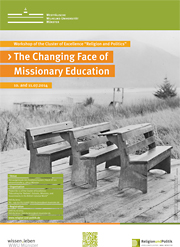The Changing Face of Missionary Education
International Workshop of the Cluster of Excellence “Religion and Politics”

The modern missionary movement provided many Indigenous and non-European groups exposure to European forms of knowledge through informal and formal instruction, particularly through schools. At such sites, various forms of knowledge and culture were dynamically transferred and transformed between Euro-missionaries and pupils, as well as across other groups in classrooms that mixed cultures and ages, as well as religious, social and gender groups.
This workshop focuses upon the overlooked role of Indigenous and non-European people working within schools run by missionaries, including day-schools, boarding schools, and industrial schools. Scholars from Africa, Canada, Germany, New Zealand, and Switzerland will discuss case studies of individuals as well as various missionary groups in order to compare the possibilities available to, as well as limitations placed upon, these non-European teachers within missionary schools across the colonial world. How were these people recruited and trained? How were they perceived by others around them, including those in the schools, on the stations, in the colonies, and in the home-countries of the missionary societies? How did changing political, social, and religious expectations affect their roles? What influences could, or did they, exert upon the curricula? What role did individual teachers play in the epistemological cleavage between children and parents that many missionary groups deemed necessary to create in the nineteenth century? In what ways did these teachers perceive themselves as part of a transnational religious or knowledge community? These are just some of the questions that will be explored in this workshop examining the changing face of missionary education.
The Changing Face of Missionary Education, 10. and 11. July 2014
Hörsaalgebäude des Exzellenzclusters
Raum JO 101
Johannisstraße 4
48143 Münster
Programme
Thursday, 10. July 2014 |
||
| 14:15-14:30 | Greeting and Introduction | Felicity Jensz, Münster |
| Confessional Influences in Mission Schools in Africa | Chair: Felicity Jensz, Münster | |
| 14:30-15:00 | Volkskirche, Volkekunde and Apartheid Education: Missionary Education, German Anthropology, and Science in African Education | Peter Kallaway, Cape Town |
| 15:00-15:30 | ‘Bush schools’ and the Africanization of Catholic Faith. Missionaries, Teachers and Catechists in Southern Tanganyika, 1920s and 1930s | Richard Hölzl, Göttingen |
| Changing Attitudes Towards African Teachers | Chair: Patrick Harries, Basel | |
| 16:00-16:30 | Christian Missions, Western Education and African Female Teachers in Nineteenth-Century Sierra Leone | Silke Strickrodt, Berlin |
| 16:30-17:00 | From ‘Evangelist’ to ‘Professional’ Teacher? Changes and Continuities in the Perception of African Teachers and African Teacher Training in Natal (1840s–1930s) | Nicolas Schicketanz, Basel |
| 17:00-17:30 | The Establishment of Independent Schools in British East-Africa (1920s–1930s) | Ciprian Burlacioiu, München |
| 17:30-18:00 | Discussion | |
Friday, 11. July 2014 |
||
| South-South Connections | Chair: Rebekka Habermas, Göttingen | |
| 09:30-10:00 | Catherine Mulgrave, the Returnee African as a Pioneer of Girl Child Education in the Gold Coast in the Nineteenth Century | Abraham Nana Opare Kwakye, Basel |
| 10:00-10:30 | Negotiating Sources and Spaces: Bolivian Teachers, New Zealand Missionaries and the Bolivian Indian Mission, 1908–1941 | Hugh Morrison, Dunedin |
| Canadian Native Teachers | Chair: Silke Strickrodt, Berlin | |
| 11:00-11:30 | Ending a Mission, Beginning a School: Jesuit Missions and the Culture of Education in the St. Lawrence Valley at the End of the Eighteenth Century | Thomas Peace, London/ ON |
| 11:30-12:00 | Indigenous Teachers at Grand River, Ontario in the Nineteenth Century | Alison Norman, Peterborough/ ON |
| 12:00-12:30 | Trawling Indian Office Reports for Elusive References to Indigenous teachers in Canada, 1867–1900 | Felicity Jensz, Münster |
| Training Institutions and Cultural Intermediaries | Chair: Hugh Morrison, Otago | |
| 14:00-14:30 | Recruitment, Training and Conflicts Surrounding ‘Native teachers’ in the Moravian Mission in the Danish West Indies in the Nineteenth Century | Jan Hüsgen, Hannover |
| 14:30-15:00 | Recovering Cultural Intermediaries: Different Perspectives on a “German” Protestant Mission in Late Ottoman Beirut | Julia Hauser, Göttingen |
| 15:30-16:30 | Discussion | |

